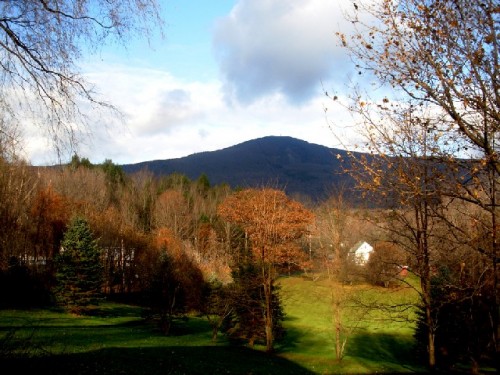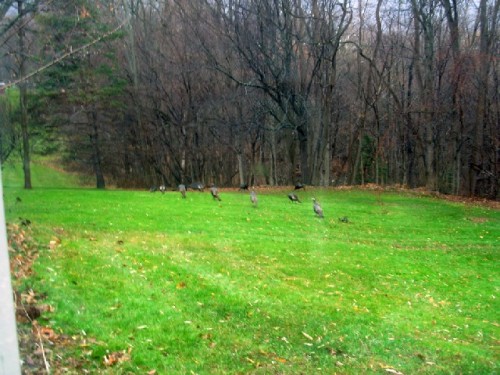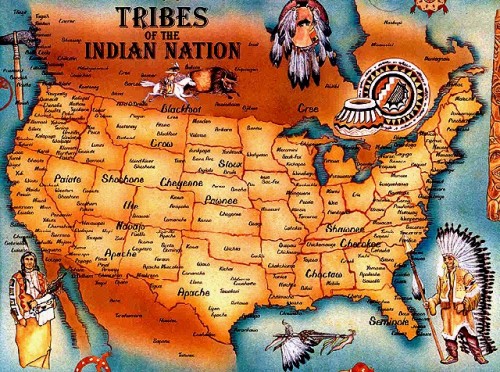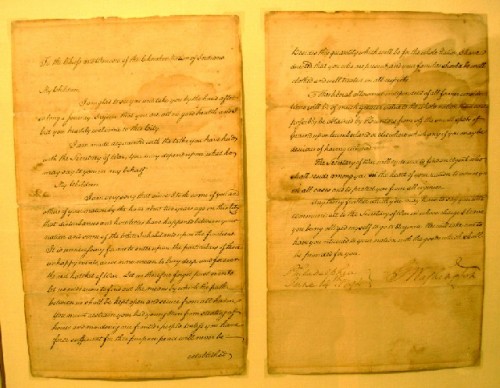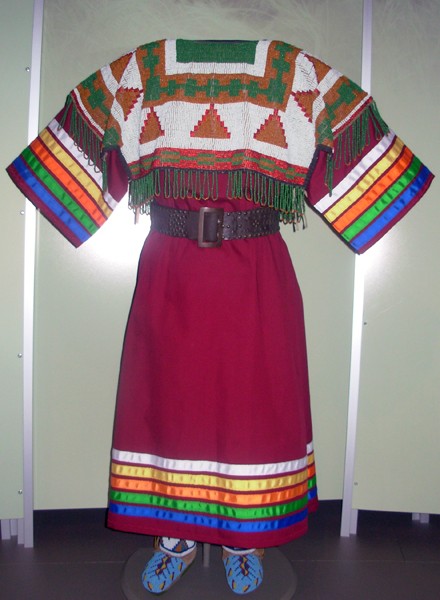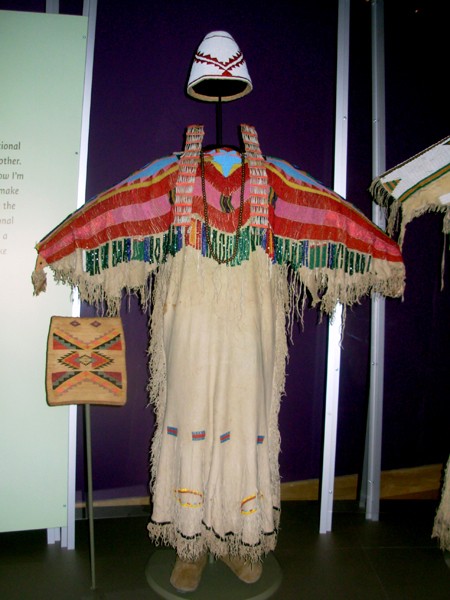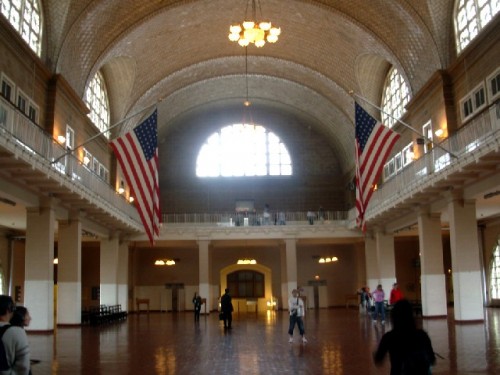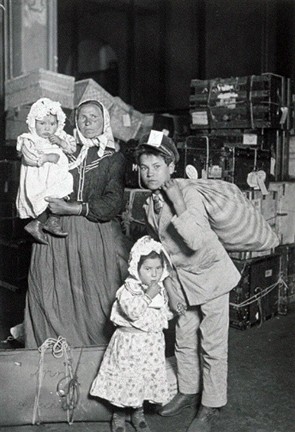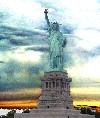Thanksgiving 2008
Turkeys, Liberty, Immigrants, Native Americans
By: Charles Giuliano - Nov 25, 2008
While visiting Big Y in Adams there was a wide expanse in the meat section with stacks of fresh Butterball Turkeys. They seemed pricey at about $2.98 a pound. There were cheaper ones at $1.98 a pound in freezers.
We plan to have our Thanksgiving dinner this week at the Williams Inn which is always fabulous. What a feast. The chef goes all out. And, you don't have to do the dishes. But the down side is that you don't get to enjoy the leftovers. Those sandwiches with gravy, stuffing and cranberry sauce. Then a hearty turkey soup with a broth extracted from the remains of the carcass with scraps of meat to add later for flavor and texture. Generally, after all that turkey, you are pretty much set until next year. Although now and then Big Y offers two for one or has it on sale for $.99 a pound. That's what I'm counting on this Friday. We would like to get together with friends and have a post holiday celebration
Actually, I have gotten to know some turkeys quite intimately so it is a bit sad to see their relatives slaughtered, dressed, wrapped, and stacked in piles at the supermarket. In a way, it says something about America All that slaughter in honor of a national celebration. A day when families gather and acknowledge the bounty of the land. E Pluribus Unum. One Nation Under God, with Liberty and Justice for All. Well, kindah. .
From my basement studio window there is a wonderful view of Mount Greylock, the highest peak in Massachusetts. Which, by the way, is named for a Native tribe the Pilgrims encountered when they settled here. There are none of the tribe remaining. Sometimes I am startled to look up and see a turkey walk by. They come within inches and generally I frantically look for my camera. There is a group of eight and we have been watching the growth of the little ones wondering if they will be big enough to endure a harsh winter in the woods. They seem quite used to a human presence as they wander about foraging for food. But if you try to approach they will scatter rather quickly.
This is our second full time season in the Berkshires so these contacts with nature and wild life are still a thrill. We see a family of deer quite often. Now and then in the summer we hear the crows screeching and hollering. We have learned that it means a fox is prowling about. Back in East Boston we spotted, and smelled, a lot of skunks and the occasional possum. For a time, a great owl was hanging out in our immense willow tree. But for city folks such encounters are rare.
The turkeys in our back yard are lean and tough compared to those plumped up birds at Big Y. Neighbors who have shot them say that they are too tough to eat but make a nice soup. So when the Pilgrims and Indians sat down together in peace, that first Thanksgiving, they hardly feasted on plump slices carved from butterballs. Later the Senecas came up with burnt corn soup after their villages and crops were torched.
As we read deeper into our history there is a dark cloud cast over such Holidays as Thanksgiving, a day of loss for Native Americans, as is Columbus Day. It is absurd today to state that the guy from Genoa "Discovered" America. In fact, two continents were named for an Italian cartographer, Amerigo Vespucci (1454-1512). So what does American really mean?
As a child in America, in the 1940s, I remember gathering around the table of my grandparents, James and Josephine Flynn, at 88 Gardner Street, in Allston. We sat under a Tiffany lamp. It was always fun to visit the kitchen when we arrived and see the turkey being basted. There was a dish towel placed over the bird to keep it moist. This was removed in the final hour to brown the bird and crisp its skin. It seemed strange to ruin a perfectly good dish cloth.
Even though he was master of the house, and head of the family, Grandpa Flynn would defer to my dad. "Doc, you carve the bird" he would say. Dad was a surgeon and he sliced the bird with the consummate skill of his profession. As the kid, I was served the drum stick which was a great treat. We were at war back then so those gatherings had a special significance. I kept a scrap book with clippings from Life Magazine and remember the news reels of Movietone News when we went to the movies once a week. Usually Sunday afternoon.
That famous Norman Rockwell painting on the cover of the Saturday Evening Post always reminds me of what Thanksgiving was like in what now seems like such an innocent era. We were the good guys and heroes of the world. The comic books I devoured were full of super heroes fighting for freedom, truth, justice, and the American way. The enemy was depicted in such strident and racist images. As kids in the alley we played Japs and Germans or Cowboys and Indians. For Christmas I begged for pistols and holsters just like Hopalong Cassidy and Tom Mix. When I grew up I was going to shoot all the bad guys. My first novel, some seven pages, was about two guys, Rawhide and Jake, who drove a stage coach between two cities. I tried to get grownups to read it but they were too busy.
During a visit to New York, last September, we were in the Wall Street area. We dropped in at the Smithsonian's National Museum of the American Indian. There was a wonderful special exhibition of elaborate women's garments with intricate design and bead work. The examples were from many tribes and periods including ones created for contemporary Fancy Dances.
From the museum it was a short walk to the ferry to the Statue of Liberty and Ellis Island. Even though I lived in Manhattan for several years in the 1960s, and we have visited many times over the years, it was something I had never done. Approaching the island with the colossal statue everyone was posing and taking pictures. We opted to travel on to the next stop and visit Ellis Island which is now an enormous museum.
In the great hall we tried to imagine all those immigrants being processed. The Italians who arrived without papers had their documents stamped "W.O.P." It became a slur for all Italians. Ironically, my grandfather did not suffer that indignity. He was a stowaway on a boat from Sicily. He just jumped over the side in New York and never officially entered the U.S. or became a citizen. My Irish ancestors sailed to Boston and first settled in Charlestown before becoming homesteaders in Rockport. So they too avoided Ellis Island.
In that sense, unless you are Native American, we are all immigrants, or the children of immigrants. It was Their Land before it became Our Land.
It is a rainy day here in Adams. You can't see Mt. Greylock as it is shrouded in clouds. The trees are bare but there are accents of white from the birches and patches of evergreens. The land is ancient and beautiful. We are its current owners and custodians. It makes me think of people who were here before us and those who will enjoy that wonderful view of the mountain long after we are gone. As Native people often remind us, we must respect the land. It is all we have. And each other.

